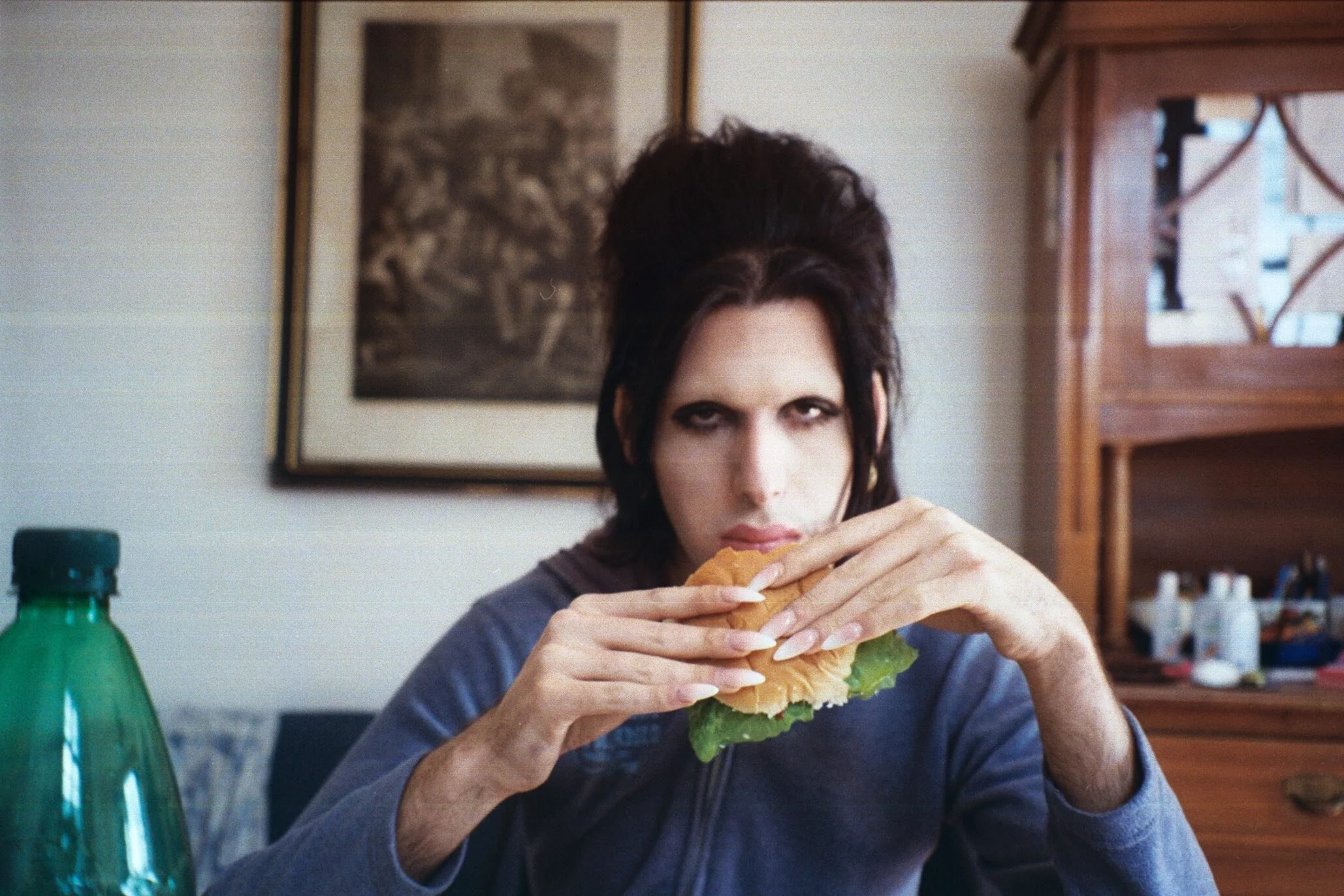Eclecticism from Tuscany. The sweetest darkness: LUCA PISCOPO
Like a jawbreaker, Luca Piscopo’s creations slowly dissolve before your very eyes, leaving a lasting taste.
A creator in several fields, the artist behind ‘Candy Oscuro’ leaves their trademark in every project they work on. From goth baths and sleep paralysis nightmares, we can get closer to the root of their identity.
Through a series of images in which fashion acts as an euphoric escape, Luca develops an aesthetic that allows one to find beauty in darkness and a sense of comfort in taboos.
This multi-talented artist explores not just their own persona and relationship with art but also forces us to consider important topics with their beautiful imagery.
The GATA team sat down with the artist to get a deeper understanding of their creations and learn that even in times of a pandemic, creation must go on.
Who is Luca Piscopo and who is Candy Oscuro?
I would say that Luca is the nucleus from which everything is created. Candy was a character I invented to represent a story, a testimony of something that was happening inside and outside of me.
You are an artist but you have also worked as a director, stylist, photographer, model and musician. If I was to ask you what your main line of work was, what would you say?
I feel pretty eclectic, I get bored very easily. I constantly switch between mediums even if it is just for fun, so that I can go back and keep working on the main project I’m working at. However, I am very fascinated by photography and film, I feel that they are related to the concept of death and immortality.
Fashion seems to be a huge part of your creativity and work. How did this relationship start?
I was always extremely fascinated by fashion as a tool for storytelling and as a way of expression and deception. Since a young age I admired how popstars and public figures used fashion to amplify themselves as well as morph their exterior selves. Quickly I began to experiment with this syntax.
Recently P.H.F. dropped a fresh and ambitious project produced by Danger Collective Records in which you both directed and starred in their entire 45 min visual album for the musician. How was this experience? Was this project proposed to you or were you involved from the beginning?
I got involved when P.H.F. said he had an idea for a project on his Instagram stories. We started talking and we realized we were really in sync and we liked a lot of the same things, it just worked. The experience was very enriching, it felt like a big challenge me and my team had to overcome in order to go further. It wasn’t easy to film everything during Covid-19 and in a restricted period of time during the hot Italian summer, but we made It work.
shot by Luca Piscopo’s mother.
“I created Candy as sort of like my personal heroine against toxic masculinity, the gender binary, misogyny and all the things that I disliked.”
shot by Luca Piscopo’s mother.
During quarantine you were stuck in your parent’s house in the countryside. Rather than surrendering to lethargy, you created a lot and gave birth to a very interesting project called ‘Candy Oscuro’ which involved your mother. Could you tell us a little bit more about this?
I created Candy as sort of like my personal heroine against toxic masculinity, the gender binary, misogyny and all the things that I disliked.
I started to live like that, I changed my Instagram name to Candy, made a new email, new digital identities for this character I was embodying. People started calling me Candy and saving my contact as Candy in their phones. It was very real. I shaved off my eyebrows, I started to grow my hair, I wore long nails, I wore skirts and dresses.
As lockdown hit, due to a series of twists I ended up prolongating my weekend stay at my parents to three months. At that point I had the choice to either continue with what I was doing and show my parents this part of me or hide from them. I decided to be honest. I started to include them, through long and hard conversations about identity and gender, and slowly they started to grasp what the project and I was about.
“ I decided to be honest. I started to include them (their family), through long and hard conversations about identity and gender, and slowly they started to grasp what the project and I was about. ”
I knew from the start that I wanted to not only interpret this character but also portray it through the medium of photography.
One morning I couldn’t get the picture right, so I asked my mom to help. The pictures came out great and that’s when it started. From then on she took 95 per cent of the pictures for the project. It was an extremely intimate experience that made me channel out of myself something that was long overdue and that was just dying to come out and explode.
While I was in Tuscany, I also found 90’s tapes of my mom filmed by my dad on their summer trips. I fell in love with them instantly, that’s when the two publications were born, a collection of photographs of me by my mother and a collection of stills of my mother’s tapes curated by me.
shot by Luca Piscopo’s mother.
shot by Luca Piscopo’s mother.
Most of your work leaves a Giallo flavor, reminiscent of the traditional Italian country from a suspense movie. How has Italian culture influenced you?
Italy has influenced me in every way possible. I have spent the early periods of my life in haunting landscapes, cathedrals, historical museums, surrounded by art.
I view Italy as a very dark and gothic place, perhaps contrary to popular perception.
Glam with a hint of horror and darkness, beauty with a hint of the absurd. Where is the line that separates those two sides?
I was looking at make-up campaigns with and without photoshop editing the other day. In one picture, the difference was shocking!
Without the editing the model locked like a zombie, and actually really ugly. That is exactly why I would have preferred that version to be the final one for the campaign.
In your project ‘Housewife fetish’ you played with your own identity and that of ‘the housewife’ in a specific space such as the countryside, using fetish as a catharsis for this character you created. Why is fetishism a recurrent element in your creations?
I wouldn’t say it is such a predominant theme in my work, however, sex has always been a taboo topic while growing up and exploring in depth the different symbolic values of fetishism was very cathartic for me and the character in ‘Housewife Fetish’.
The character of the housewife being the emblem of the woman not being allowed to be aroused or provoke sexual pleasures to herself, using fetishism to gain emancipation over herself.
“...sex has always been a taboo topic while growing up and exploring in depth the different symbolic values of fetishism was very cathartic for me... (About ‘Housewife Fetish’)”
shot by Luca Piscopo’s mother.
shot by Luca Piscopo’s mother.
Where do you find your main inspirations?
Movies, music, internet subcultures, everyday life, photography, fine art.
Identity and reality are elements you often bring to your creations. Is your visual work a way of exploring different sides of yourself and also a way of expanding and shaping your true self?
Yes, absolutely.
P.H.F. - New Metal - A Visual Album
Do you have any projects coming up in the future that you can tell us about?
Definitely photographic projects. For the rest I’m unpredictable also for myself.
As a visual artist, could you recommend GATA any movies you love or that have had an impact on you?
Theorem (1968) by Pier Paolo Pasolini
The Witches (1967) by Multiple Directors
Juliet of the Spirits (1965) by Federico Fellini









